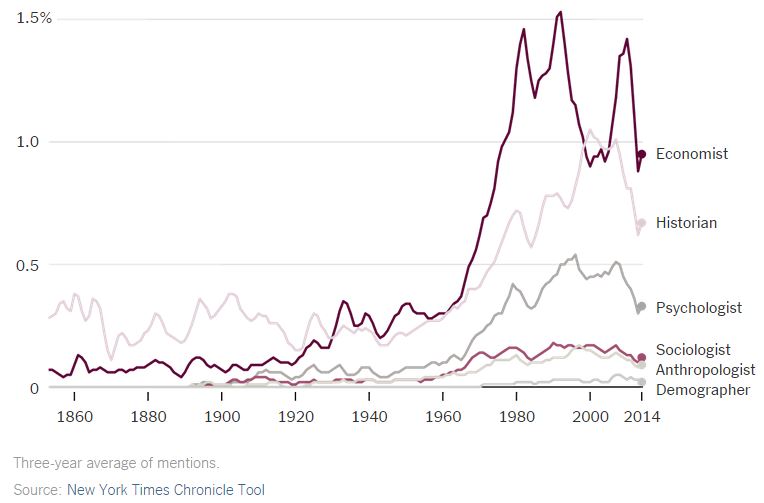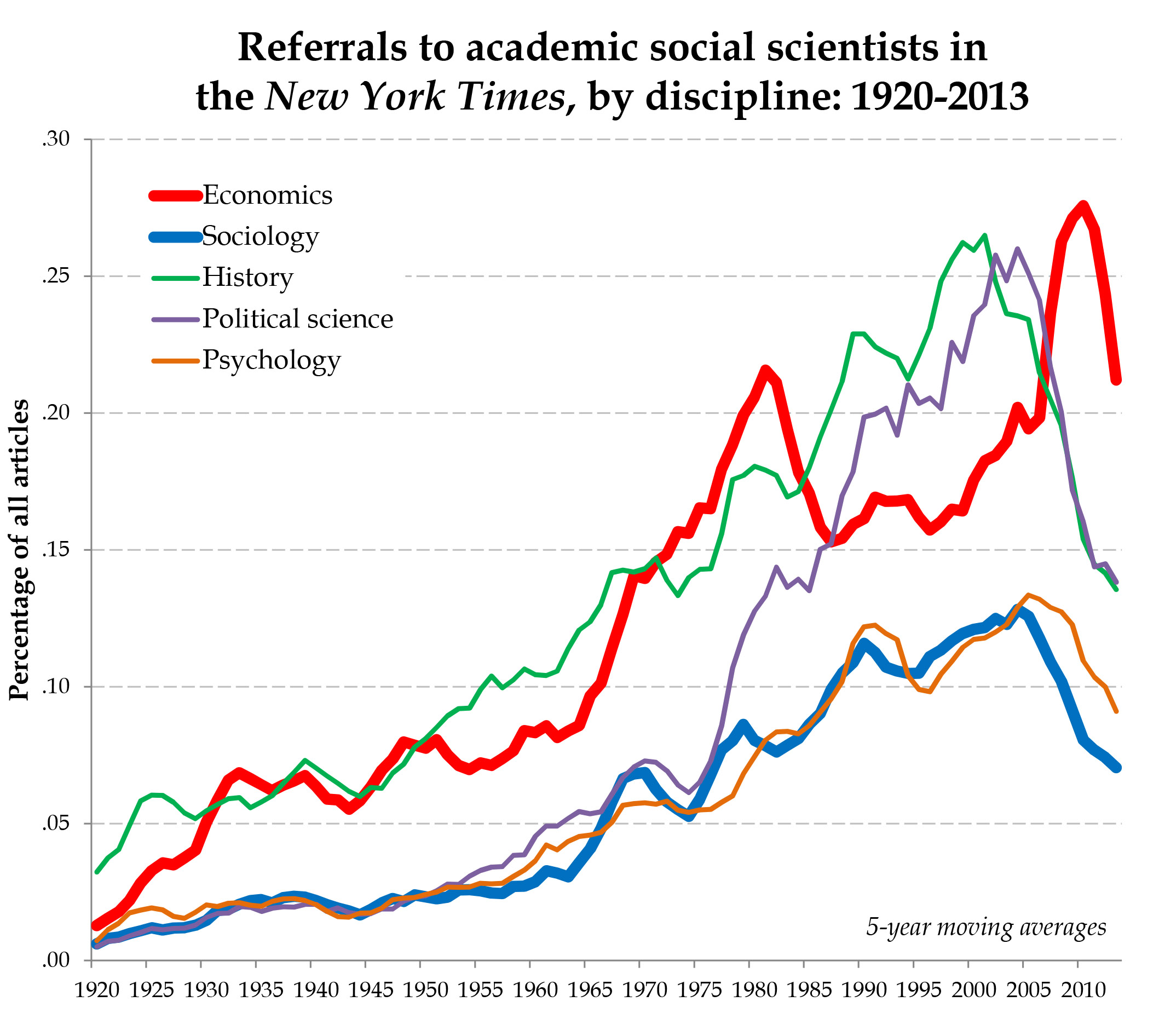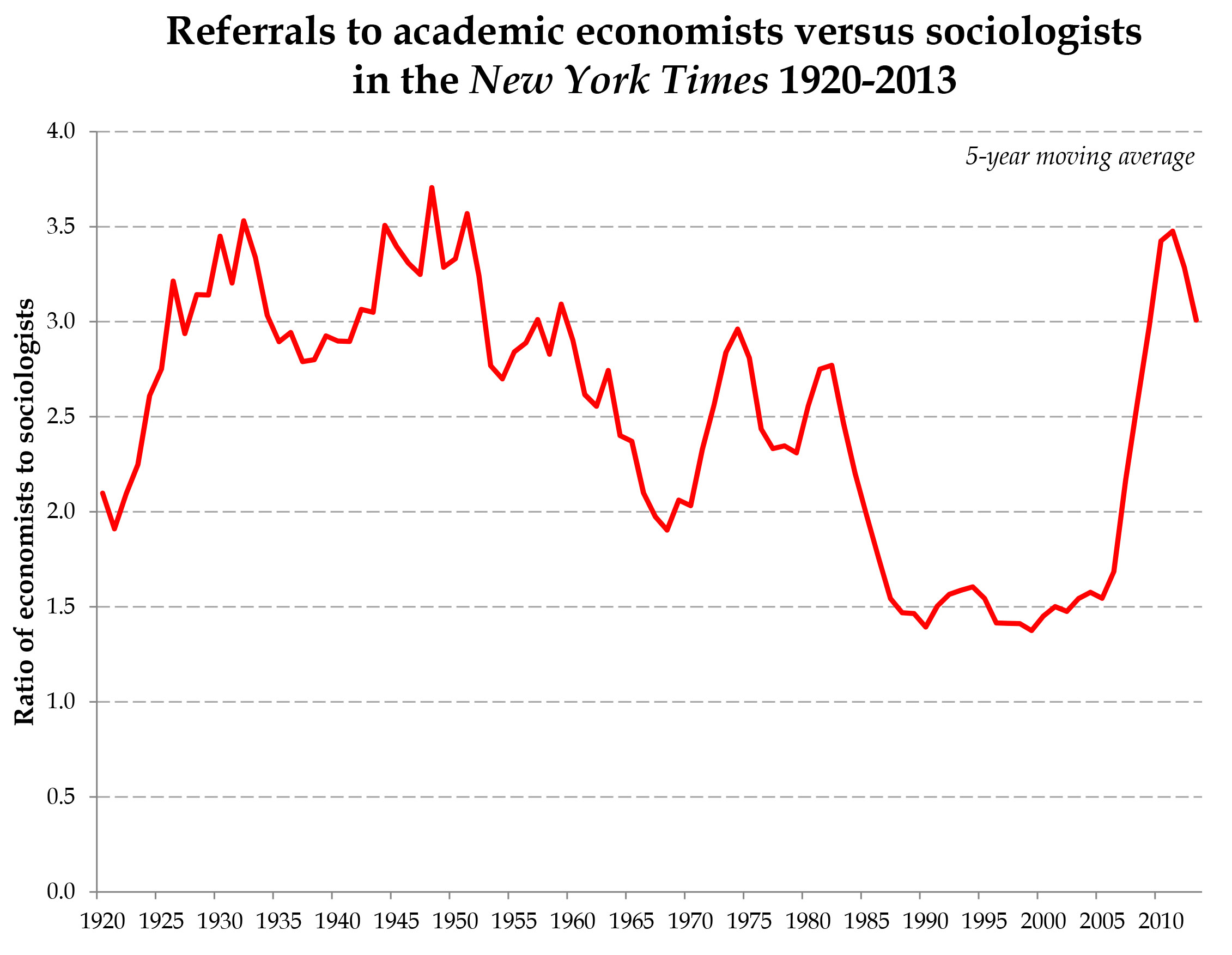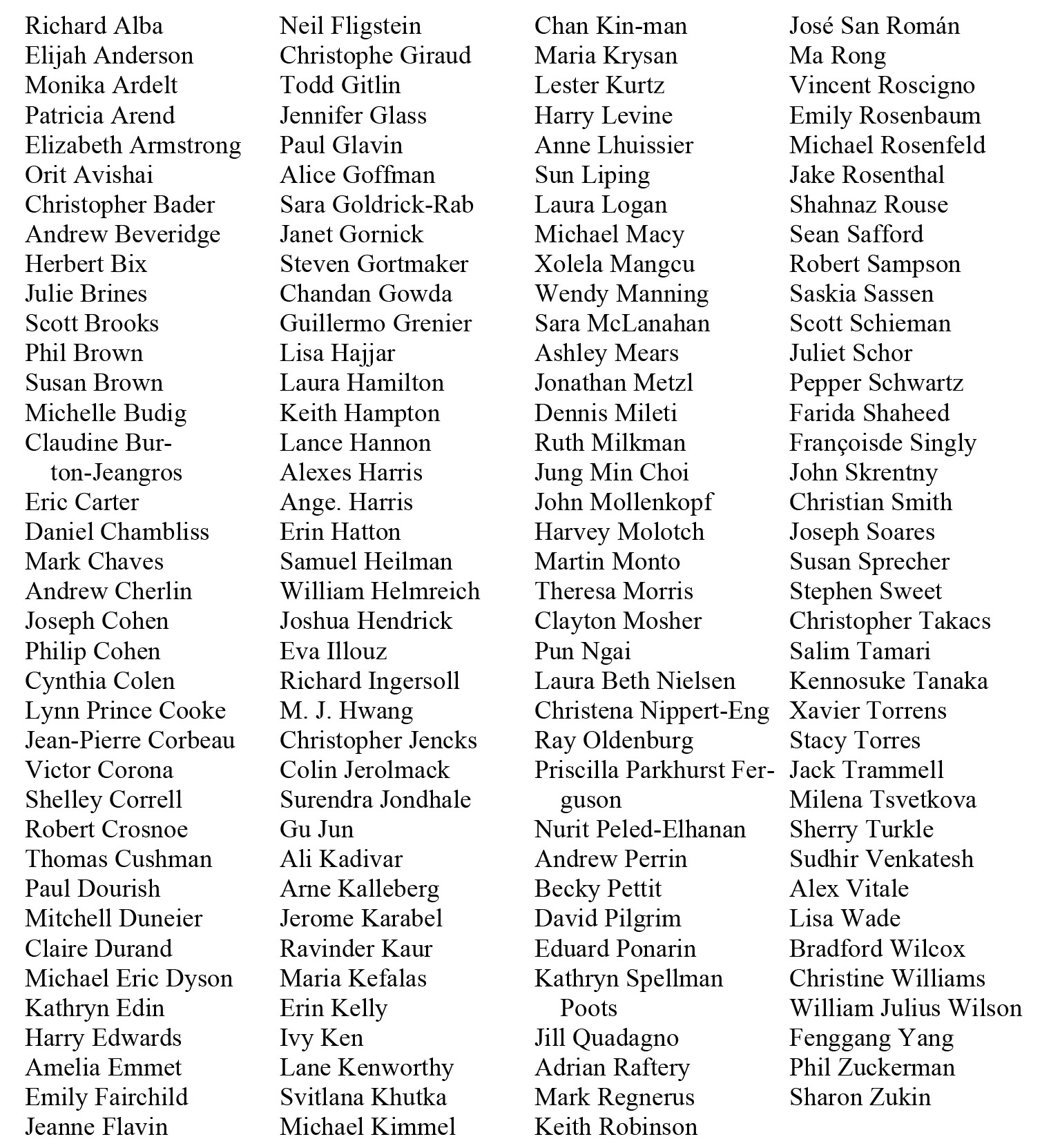Sociology unfound
The economist Justin Wolfers, writing for the New York Times Upshot, reports that economists increasingly outnumber other social scientists in mentions in the both the Times and — even more — in the Congressional Record. About 1% of Times stories use the word “economist,” more than three-times as often as they write “sociologist.” Here’s his figure tracking Times references:
In the Congressional Record the economist-sociologist ratio is 20-to-1. I’ll show some other numbers, but first a little setup.
Wolfers writes, pretty reasonably:
Most striking is the poor showing of sociology, whose relevance to policy makers appears to be minimal, even though it focuses on many of our most pressing problems, including families, crime, education, aging, religion, community, inequality and poverty.
Of course, sociologists, whose comparative advantage is in offering structural explanations, might point to the fact that their field has no equivalent of the business pages, that the president does not receive advice from a Council of Sociological Advisers, and that there’s little demand from Wall Street for sociological insights. Perhaps, although topics like crime, family and faith are grist for the daily newspapers; an array of federal agencies are responsible for dealing with topics like housing, education, labor and human services; and Silicon Valley is hungry for insights from sociologists who study networks.
As my co-editor Syed Ali wrote recently about Orlando Patterson’s op-ed in the Chronicle of Higher Education, sociologists are used to hearing about our irrelevance. Elizabeth Popp Berman pointed out on Orgtheory, however, that we can’t explain this pattern just by looking at sociologists. Economics in particular has been the beneficiary of a long campaign that includes academic expansion, political institution-building, and — Syed adds — political centrism or conservatism.
One result of that development is there are a lot more people outside of academia whose job title is “economist” than there are “sociologists.” So Wolfers’ use of “economist” versus “sociologist” catches all those non-academic economists, while the non-academic sociologists may be more likely to have other titles. To choose one example, Pew Research Center analysts are frequently in the news, with titles such as “Senior Researcher” (Gretchen Livingston and Wendy Wang), “Demographer” (Conrad Hackett), and “Research Associate” (Besheer Mohamed) — all of whom have PhDs in sociology.
Don’t get your hopes up, but I reran the trends in the NYT‘s Chronicle tool using “professor of economics [etc.]” and “economics [etc.] professor,” to narrow the comparison of references down to academics. This really boosts the standing of political scientists, sociologist, and historians, relative to economists. Here are the trends for those terms:
I have to mention that, besides our dickering over disciplinary feats, we should notice this is an amazing image of the growing influence of academic social scientists, who increased their representation in the Times about 10-fold over the last century. (I excluded 2014 because the data appear to be messed up.)
Anyway, by this accounting, academic historians were running about equal with economists until the mid-2000s, and political scientists had a good couple decades as well. (Psychologists — another profession with a major off-campus presence — are now down around sociology’s level.)
We need sociology to understand this
Wolfers looks over the whole trend and grudgingly declares victory, “This economist is drawn to conclude that … our popularity reflects the discerning tastes of our audience in the marketplace of ideas.”
It would be sour grapes to argue with that. But not everyone is shopping in the same marketplace. So part of the issue is, what’s the audience? The Times is an organization, and a for-profit corporation. It influences public opinion, and it is an authoritative source of information, but it is not a neutral reflector of the marketplace’s ideas. And as an organization, it has a history.
Look especially at the last decade. It’s hard to tell from the last figure, but between the 1930s and the 2000s academic sociology was actually closing the gap with economics, with the econ/soc ratio falling by about half. Here’s that trend highlighted:
The long-run trend was completely erased after 2005. In fact, if you look back at the previous figure you can see all but economists being run off the pages after that point.
What is the context? Wolfers is an economist, of course, writing in a high-profile new section that prominently features economic writing. How did we get here?
The paper was shaken by the Jayson Blair scandal in 2003, and then by a scandal over planted stories about Iraq’s supposed weapons of mass destruction leading up to the U.S. invasion. The newspaper business was collapsing. From November 2003 to November 2008 the company’s stock price fell 90%. It reorganized and consolidated, laid off reporters, cut sections, and increased web publishing and ad sales. In 2008 they promoted William Schmidt — who was in charge of newsroom finance and administration — to deputy managing editor, replacing Jonathan Landman, who became culture editor. The Economix blog was launched in 2006. Today’s Upshot (which subsumed Economix) is edited by David Leonhardt, who was an economics columnist before he was promoted to Washington bureau chief in 2011. That promotion was a dramatic move, elevating an economics writer who hadn’t been a Washington political reporter. Upshot is a “data journalism” hub, which often (but not always) implies an economic focus. (On the opinion pages, economist Paul Krugman writes a column twice a week, and Joseph Stiglitz moderated a long series on inequality.) This can’t be the whole story, but in broad strokes it’s fair to say the paper as an organization moved in the direction of business and economics.
Sociologists in print
On the issue of audience and impact, it’s worth asking what sociologists are speaking about, and to whom. I actually think that on the list of issues Wolfers mentioned — education, aging, religion, community, inequality, poverty, crime, family, faith, housing, education, labor, and human services — sociologists are cited pretty frequently. Maybe part of the issue is that those subjects need more attention from the Times. Last year I counted 124 academic sociologists cited in the Times’ pages for the year 2013, using a Lexis-Nexis search for “sociology or sociologist” within 10 words of “professor,” and then excluding letter writers, obituaries, weddings, and event announcements. I redid that search for the year 2014, and this time I found 148 sociologists. These people were cited in news stories, or wrote op-eds, in which they were identified as academic sociologists:
Now added: Hector Cordero-Guzman, Fabian Pfeffer, Kristi Williams, Karen Gregory.
This is a conservative count, but I don’t think I missed too many (feel free to add names or links in the the comments — don’t be shy).
Finally, it’s worth mentioning gender. I previously reported that two-thirds of Times articles are written by men. The Business, World, and Opinion sections are all more than 70% written by men, while women write the majority of stories in five sections — Fashion, Dining, Home, Travel, and Health — which account for 11% of all stories. I can’t be sure, but it’s possible more sociologists would be cited in the paper if more women were writing the news.





Comments 21
Sociology unfound - Treat Them Better
January 25, 2015[…] Sociology unfound […]
On Contexts: Sociology unfound | Family Inequality
January 25, 2015[…] Over on the Contexts blog, I wrote a follow-up to Justin Wolfers’ piece about economists dominating the news: here it is. […]
Noah Askin
January 25, 2015Philip -
Interesting to see these analyses, which paint a (slightly) different story than some of the others that you reference.
I also think the presence of sociologists and economists in business schools introduces another potential confound to this discussion. Specifically, if an economist is in a business school, he or she is still often likely be referred to as "economist so-and-so of the whichever business school," whereas I'm not entirely sure a sociologist in a business school would be identified in the same manner (this is testable, of course, though I haven't done such testing). This is because they would be identified as a professor of strategy, or organizational behavior, or something more specifically aligned with business school departments, and which wouldn't get picked up in a search for "sociologist."
Moreover, I also assume that getting mentions in business sections of newspapers may be a little more likely for these business school-placed sociologists (again, a testable hypothesis) than for those in Soc. departments. I don't necessarily think this is a good thing, but it would add sociologists to your count while my hunch is it probably wouldn't increase your count of economists by quite as many.
I certainly don't know the current placement of the majority of the sociologists in the list you have above, but I know that most of those I do recognize aren't in business schools. It would be interesting to take a look at whether there's a difference if you added these to your analyses...it would also add a lot of work, unfortunately.
(and, of course, the move of Organizational Theory--among other aspects of sociology--to business schools is an issue unto itself, also discussed at Org Theory: https://orgtheory.wordpress.com/2014/04/24/is-org-theory-out-of-touch-with-sociology/)
- Noah
kristi Williams
January 25, 2015Great points! The count missed mine because my university affiliation was listed but not my title.
http://www.nytimes.com/2014/02/09/magazine/can-marriage-cure-poverty.html?_r=0
Hector Cordero-Guzman
January 25, 2015Excellent analysis, having worked mostly Policy and Public Administration programs, as well in the foundation world, I have seen some of the differences...
To your point about the role of institutional affiliation, I was mentioned at least 3 times in the NYT in 2014 but never identified as a sociologist. I teach in a school of Public Affairs...
http://www.nytimes.com/2014/10/13/nyregion/giving-a-voice-and-fair-wages-to-an-invisible-work-force.html?_r=1
http://www.nytimes.com/2014/07/02/us/census-bureau-arabs-hispanics-diversity.html?module=Search&mabReward=relbias:r
http://www.nytimes.com/2014/03/22/nyregion/melissa-mark-viverito-new-york-council-speaker-keeps-low-profile-except-on-twitter.html?module=Search&mabReward=relbias:r
Assorted links
January 25, 2015[…] 3. Have we reached peak economist? Here is a pouty (but interesting) response from a sociologist. […]
John Grady
January 25, 2015Interesting, but I'm not sure I buy the focus on the way the Times reorganized its staffing and the like as an explanation for the patterns. The last chart suggests that in economic hard times -- e.g. the Depression, post war reconstruction, impact of OPEC's increasing oil prices on the economy, and the great recession might explain why people were more interested in economists' ideas and that concern with civil rights, student unrest, welfare policy and crime surface more in somewhat more flush times with a focus on the justice or injustice, effectiveness or ineffectiveness of claims for policy attention or other forms of social recognition. also don't discount the issue of the quality of our ideas and research and our ability to communicate these to various publics.
Steve Sailer
January 25, 2015I've been a fan of the social sciences since 1972. My first publication as a freshman in high school was a letter to the editor as joking about Christopher Jencks' book "Inequality."
So as a long term aficionado of the social sciences, the reason I hang out more online with economists, statisticians, and physical anthropologists is because they are slightly less intellectually constricted by political correctness than are sociologists. So their discussions of issues falling in between economics and sociology tend to be livelier.
This situation shouldn't be impossible for sociologists to rectify: all it would take is personal and institutional courage.
Paul
January 25, 2015Good points. Maybe it's as simple as saying that people think they know what an economist does whereas what sociologists do, well it is a bit murky.
Assorted links - Freedom's Floodgates
January 26, 2015[…] 3. Have we reached peak economist? Here is a pouty (but interesting) response from a sociologist. […]
Assorted links | Homines Economici
January 26, 2015[…] 3. Have we reached peak economist? Here is a pouty (but interesting) response from a sociologist. […]
another thought
January 28, 2015I've now had two experiences where I have published an empirical paper on a topic (in high-visibility outlets), and, not too many years later, economists came along and published analyses very similar to mine, in one case without citation and in another with a footnote citation that implied a narrower analysis than I had in fact published. In both cases, the topic was picked up by the media, and in both cases the journalists only contacted the economists.
The "no citation" experience was especially egregious. The economists began their paper by saying that (paraphrased) no one had ever analyzed the link between X and Y. Well before they published it, I had sent them my already published paper containing an analysis of the link between X and Y; they acknowledged receipt. Friends in b-schools had told the economists about my work on the relationship between X and Y when the economists had taken their then-working paper on the road; one b-school friend had also sent them a copy of my paper. The "we didn't know about your work" excuse just doesn't hold water. In fact, one of the authors saw me at a conference and oozed up to say "I'm a big fan of your work on the relationship between X and Y" ... but he has yet to cite any of it.
My point isn't (just) to complain, but to suggest another reason why economics is more likely to be the "go-to" social science for journalists and policy makers: many economists have no qualms about claiming sole expertise and "first mover" status, even when they aren't. Sociologists, I think, are trained to be much more cautious. (Some might say "intellectually honest," but I don't think it's fair to accuse most economists of being intellectually dishonest.) Maybe we're too cautious for our own good.
blogging is like exercise | orgtheory.net
January 28, 2015[…] how economists came to dominate the conversation. If you’re interested in this sort of thing, Philip Cohen’s piece over at Contexts does an excellent job at contextualizing the Wolfers article, particularly with […]
Sociology unfound: A closer look at the alleged dominance of economics and irrelevance of sociology | Work in Progress
February 11, 2015[…] Philip Cohen is a professor of sociology at the University of Maryland and author of The Family: Diversity, Inequality and Social Change (W. W. Norton, 2014). He is the co-editor of Contexts, where this post originally ran. […]
What does Hannah think about Newcastle Sixth Form College? - Fileflee.com
February 15, 2015[…] is now studying Politics and Sociology BA Hons at Newcastle […]
Karen Gregory
May 13, 2015Hi, could I add the following?
Karen Gregory, City College of New York.
Interviewed for New York Times story: Altman, Anna. 2014. “Paying For Quality Education.” http://op-talk.blogs.nytimes.com/2014/06/26/paying-for-quality-education/
What's Sociology? - PeopleCount.org BlogPeopleCount.org Blog
October 12, 2015[…] friend posted, on Facebook, an interesting article about how economists are cited 3x more than sociologists. This seems mistaken, since they seem so often wrong and the economy is such a small fraction of […]
Sociology: “I love you.” Economics: “I know.” | Family Inequality
November 16, 2015[…] Sociology unfound (on the Contexts blog) […]
Is the New York Times trapped in an economics echo chamber? | Family Inequality
November 29, 2015[…] tastes of our audience in the marketplace of ideas.” I discussed the evidence for that in this post, which focused on the particular organizational features of the NYT. At the time it didn’t […]
Why I snarked on a 538 blog post (and I’m sorry) | Family Inequality
January 7, 2016[…] about how complex sociological work is neglected in favor of glib economics (e.g., here, here, here). But I do substantively object to the piece. If I had taken the time to figure out what […]
Undidesix1951
January 31, 2020You have shared a very useful post and I always like to read these types of useful articles. BTW, today I was looking for some online help to https://write-my-essay.online/ but as I am not so familiar with these types of services, so I did not find any service. Well, my friend suggests me to take some advice or tips from online sources to find a good one. What are your thoughts about this?